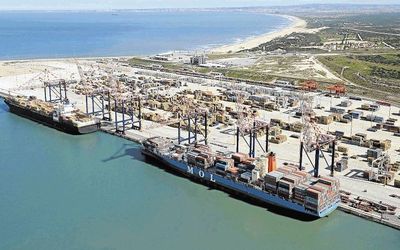THE broad consensus that exists, among political parties, social partners and economic analysts, on the Special Economic Zones (SEZ) Bill that is making its way through the National Council of Provinces is unusual for a key economic reform measure in South Africa.
It indicates that even in the highly charged political climate leading to this year’s elections, the political class is still capable of putting the long-term interests of the country and the welfare of citizens above seeking short-term party political advantage.
However, if we are to prevent devils in the detail from drastically reducing the expected effects of the SEZ programme in bringing new capital and jobs to South Africa, urgent revisions are needed to sections 12R and 12S of the Income Tax Act, which outline the benefits that will be available to investors in the zones. SEZs — small areas where special tax regimes, investment incentives and other carrots are lined up to entice local and foreign businesses to establish themselves — have proved themselves in developing countries such as Mauritius, Mexico, Malaysia and China as effective tools for catalysing sustainable industrial development.
Last April, Trade and Industry Minister Rob Davies announced, shortly after introducing the SEZ Bill in Parliament, that 10 potential SEZs had been agreed upon with provinces and would be subjected to a feasibility study.
"The purposes of the SEZs include facilitating creation of an industrial complex with strategic economic advantage for targeted investment and industries in manufacturing sector and tradable services," he said.
"This will also focus on developing infra-structure to support development of targeted industrial activities and attracting foreign and domestic direct investment."
Sections of the Income Tax Act intended to provide support to the SEZ legislation are, however, of real concern.
The first is that the tax benefits that will be available for companies investing in the SEZs can flow only over a 10-year period, starting last year and ending in 2023. Most large-scale projects take time to plan and establish, and during this time the clock will be ticking. That means that by the time a project is generating enough revenue to make a tax benefit worthwhile, the number of years over which this benefit can be accessed will be limited.
It strikes me as essential that if the focus stays on tax incentives, we should move from this fixed 10-year period to a rolling 10 years from the approval of an incentive.
If not, a valuable tool in the state’s armoury for attracting investment may be severely weakened.
Second, there is a question mark over the exclusive reliance on tax incentives, as opposed to an incentive mix involving direct grants for small and medium-sized companies. While lower taxes are, of course, beneficial to an enterprise that is already up and running, they are less attractive to a set-up business, which has yet to incur a tax liability, and — as I noted earlier — might not have a big tax bill for some time.
My experience is that the global trend, particularly after the 2008 credit crunch, is to move from tax incentives to cash grants, so this could mean South Africa is not keeping up with the competitive strategies of peer countries with the SEZ tax benefits.
We also have to be aware that potential investors in South Africa need every bit of enticement we can muster, given the difficult operational environment of, among other things. high unit labour costs, a volatile currency, a deteriorating labour relations framework and skyrocketing electricity prices.
All is not lost, though, and there are some elements of the government’s present thinking on SEZs that should be applauded.
Operations inside an SEZ would be offered a 15% corporate tax rate, compared with the usual rate of 28% — a huge reduction. This is definitely welcome and will assist certain classes of investors, but may not be useful for small and medium-sized supplier firms producing intermediate products. These typically suffer from low margins and profitability and poor access to capital markets.
Cash grants are much better in overcoming the lack of access to capital faced by these types of firms, and enhancing the sustainability of projects.
The SEZs evolved from the existing industrial development zones (IDZs), which include Coega, East London and Richards Bay, and these were recently joined by Saldanha Bay, which will focus on oil, gas and marine repair. Under Davies’s plans, IDZs would continue to be one of the elements of the SEZs — in essence, an IDZ would be a form of SEZ.
I have believed for many years that the IDZs have not been sufficiently competitive, as an investor could have secured all the benefits outside the IDZ that they could get inside. But the present plan for SEZs tries to solve that problem. As with IDZs, SEZs will be in specific areas around South Africa — in effect, they will be industrial parks.
A special regime of tax and other measures will apply inside the fence, making it a more attractive place in which to operate, to employ people and to invest.
One of other difficulties I see will be a 90% rule that is included in the planned set-up, which will mean that you would have to derive 90% of your income from business in the SEZ. But what if the investor has other business outside the SEZ, and this accounts for more than 10% of the company’s total revenue? Does the investor lose all SEZ benefits from the start? This could cause great uncertainty. Historically, there was a similar problem with the tax-holiday scheme that operated in the late 1990s — companies inadvertently put revenue through the tax-holiday company, and then lost the benefit on audit by the South African Revenue Service.
Although there was consultation preceding the promulgation of the SEZ incentives, it is not too late to recognise the flaws in the legislation and for the Treasury to take the necessary remedial action.
The rewards of getting it right are huge — in the form of new investment, new jobs and a boost to growth.
Do not forget all the noise around last year’s decision by BMW not to boost its investment in automotive assembly at Rosslyn, near Pretoria.
That illustrated graphically that we do not receive foreign direct investment as a right — it is something that has to be earned in an environment of fierce global competition.
If we get it wrong, not only will an opportunity have been missed, but public time, effort and resources may have been wasted in the flawed execution of an excellent idea.
• Newman is CEO of Cova Advisory & Associates.























Change: -0.47%
Change: -0.57%
Change: -1.76%
Change: -0.34%
Change: 0.02%
Data supplied by Profile Data
Change: -1.49%
Change: -0.04%
Change: -0.47%
Change: 0.00%
Change: 0.08%
Data supplied by Profile Data
Change: 0.36%
Change: 0.61%
Change: 0.12%
Change: -0.29%
Change: 0.82%
Data supplied by Profile Data
Change: 0.31%
Change: -0.42%
Change: 0.33%
Change: -1.40%
Change: -0.96%
Data supplied by Profile Data